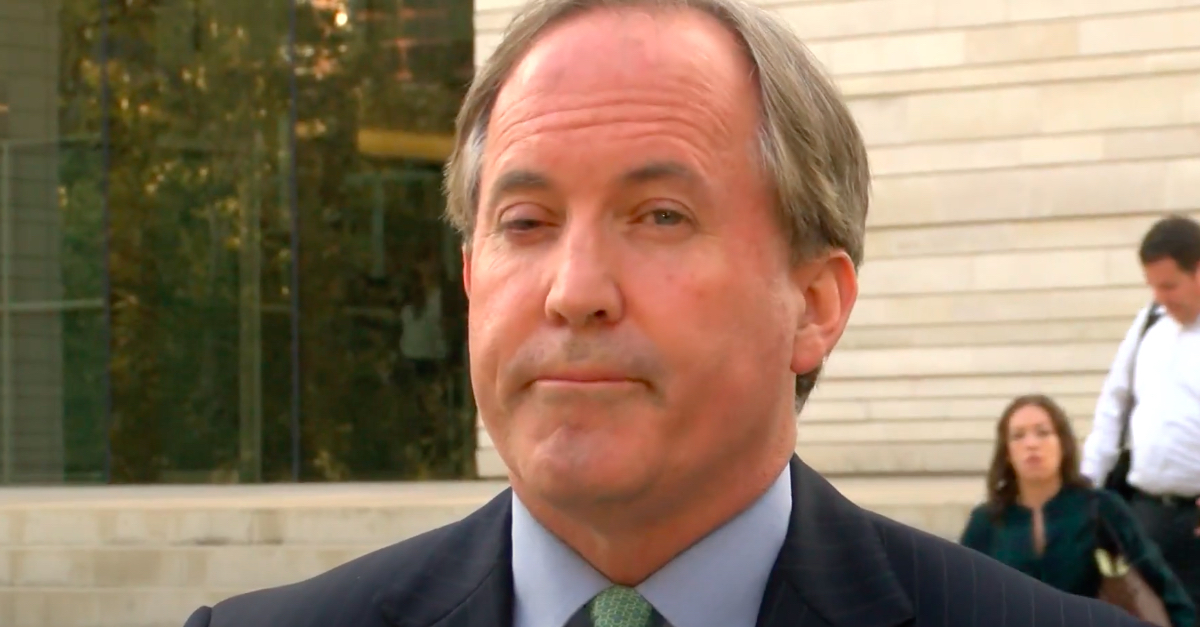
Texas Attorney General Ken Paxton
The State of Texas is trying to sue the states of Pennsylvania, Georgia, Michigan, and Wisconsin in the U.S. Supreme Court over their administrations of the 2020 election, but legal experts say this “dangerous” stunt will not succeed.
President Donald Trump lost each of these states and the 2020 election, but Texas claims that is only because of “unconstitutional” changes the defendants made. In its motion for leave to file a bill of complaint, which included the would-be bill of complaint, Texas argued that it had no choice but to bring the dispute directly to the justices, citing to 28 USC §1251(a), which gives the U.S. Supreme Court “exclusive jurisdiction” over “all controversies between two or more States.”
The nature of the action Texas hopes the Supreme Court will hear contains a laundry list of grievances that concludes Joe Biden had a “less than one in a quadrillion” chance of overcoming Trump’s lead as of Nov. 4—which was before the mail-in ballot count poured in.
It should not go without mention that Republican state lawmakers in Pennsylvania, Michigan and Wisconsin declined to ensure an early and timelier counting of mail-in ballots. In other words, the GOP refused to put in place safeguards against the very scenario that the Texas AG is complaining about.
The Texas filing also pointed to Justice Neil Gorsuch’s recent smackdown of Gov. Andrew Cuomo (D-N.Y.) in a COVID-19 matter involving the religious freedom to assemble and worship. But Texas actually modified a key Gorsuch quote in order to fit its agenda against a completely different constitutional issue.
What Gorsuch really wrote:
“Government is not free to disregard the First Amendment in times of crisis.”
What Texas presented Gorsuch’s quote as saying:
“Government is not free to disregard the [Constitution] in times of crisis.”
Notably, Texas is not alleging a First Amendment violation. Instead, Texas asserted violations of the Equal Protection clause of the Fourteenth Amendment, which sounds a lot like the case Rudy Giuliani tried and failed to make in Pennsylvania. But rather than repeating Giuliani’s risible description of election observers needing binoculars, Texas focused on “Videos of: poll workers erupting in cheers as poll challengers are removed from vote counting centers” and “suitcases full of ballots.”
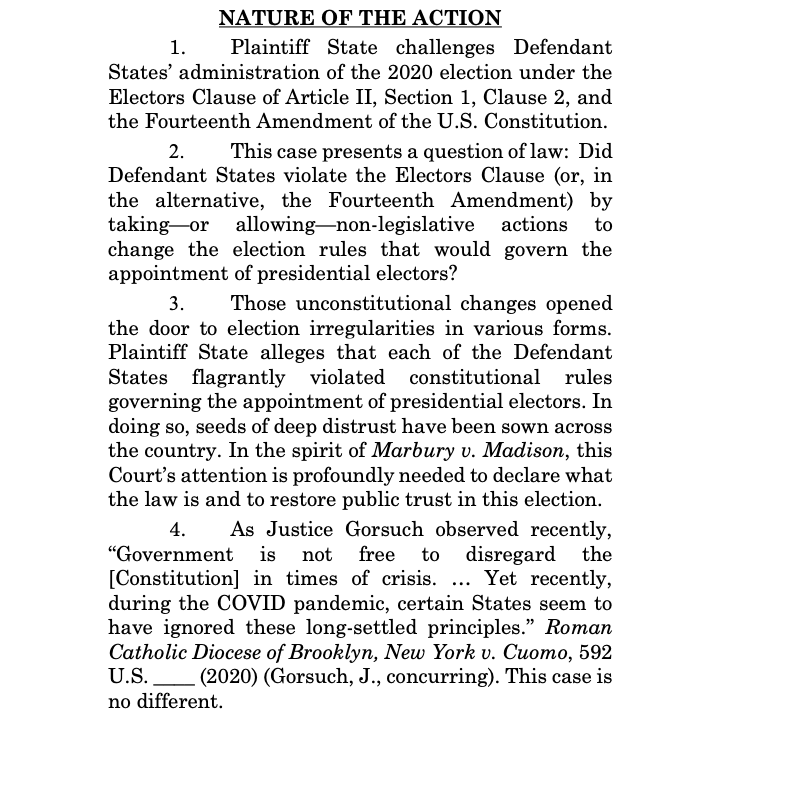
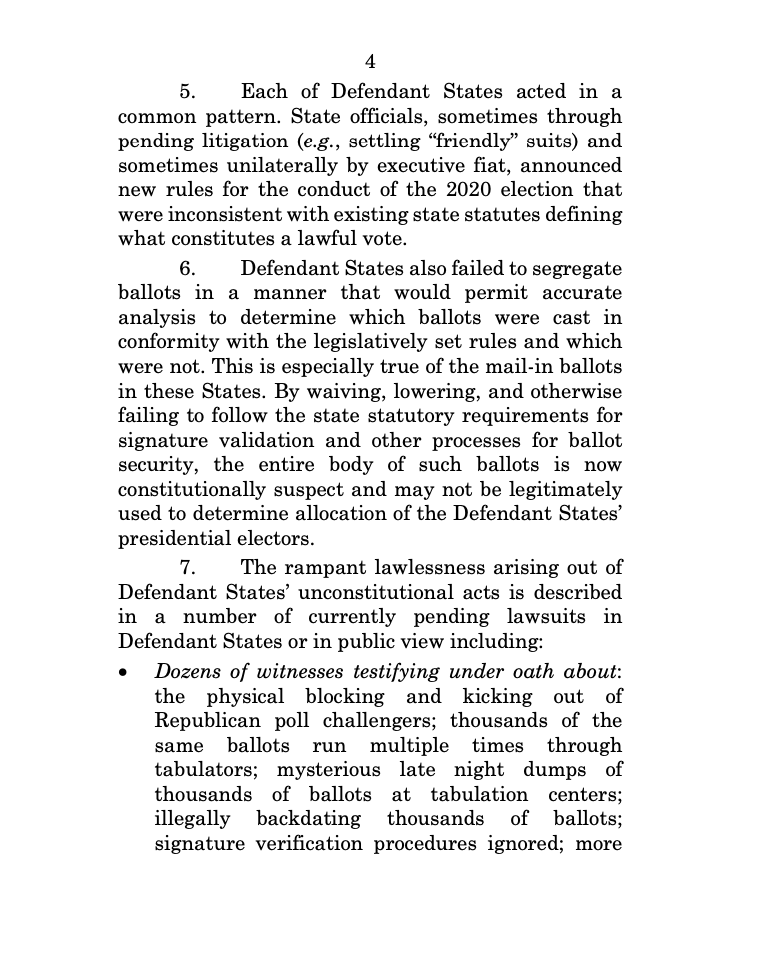
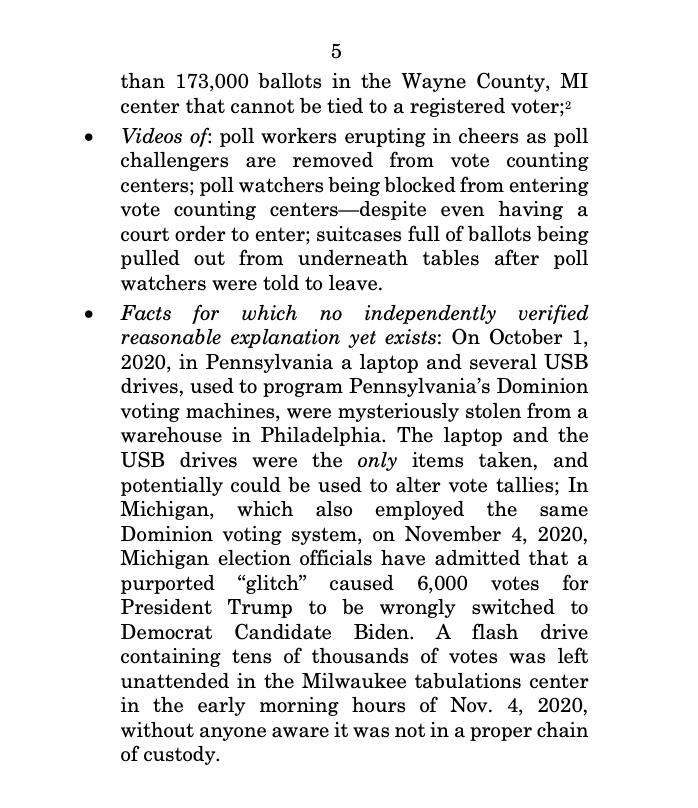
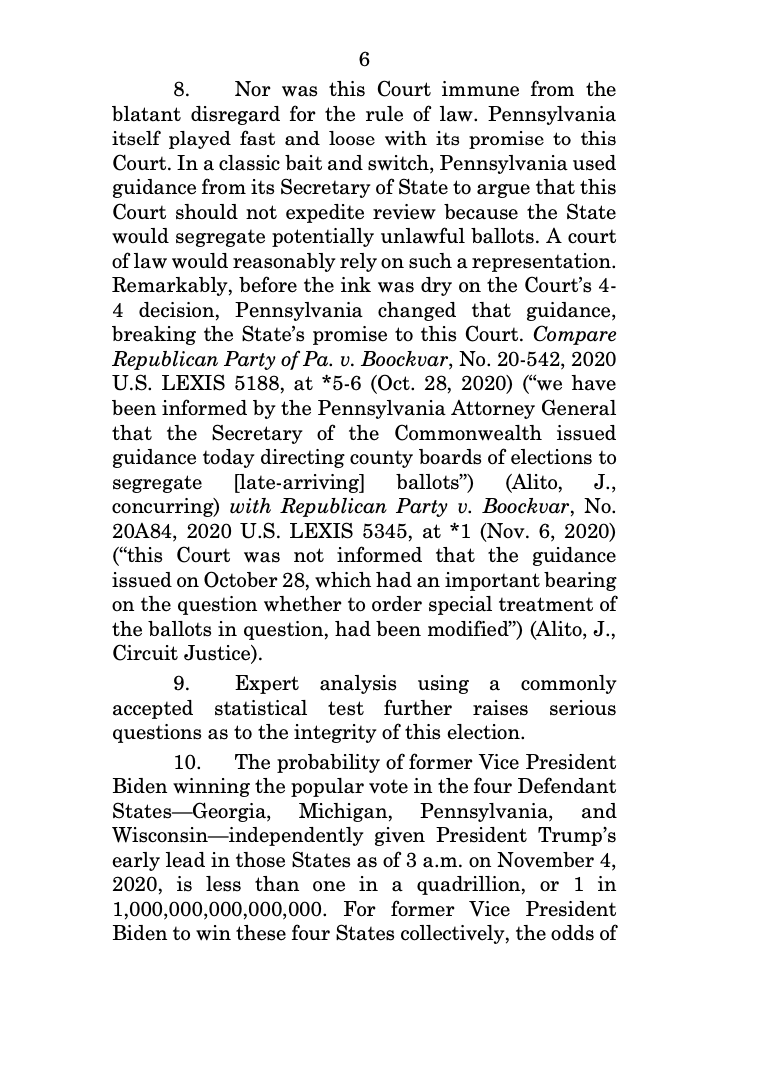
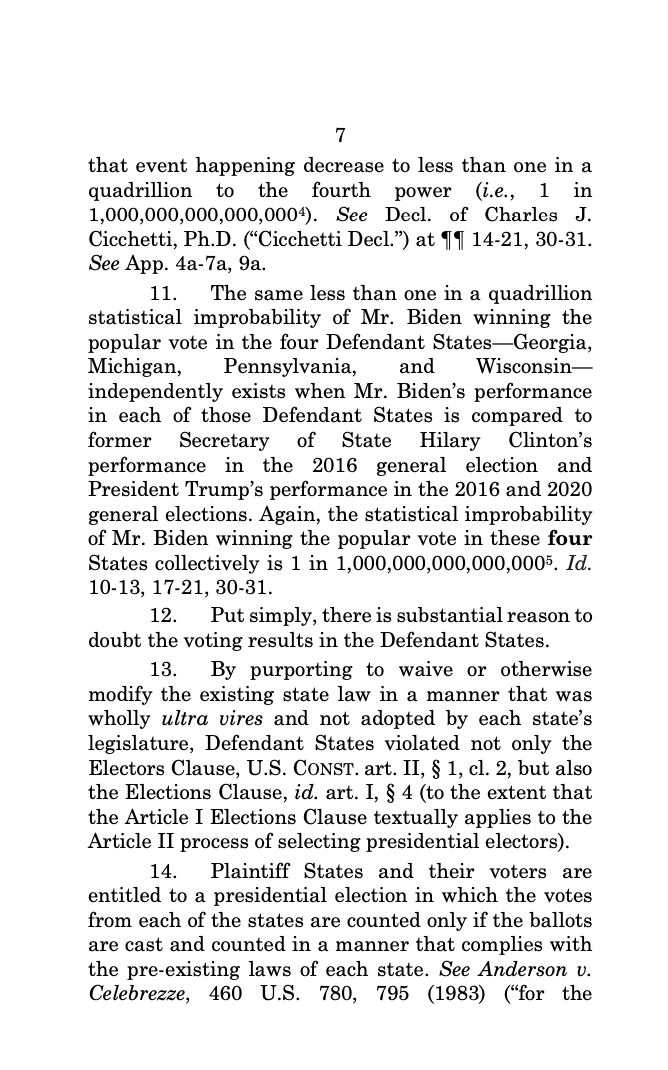
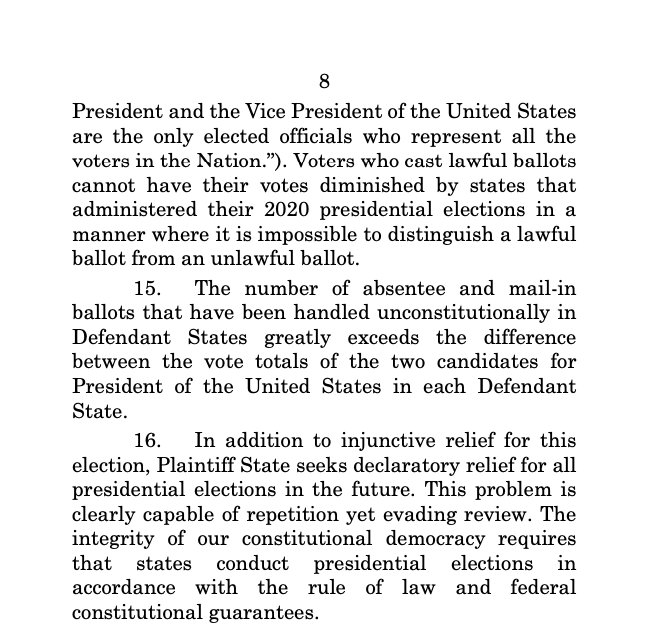
Texas asserts that it is entitled to injunctive relief in the 2020 election and “declaratory relief for all presidential elections in the future,” arguing that 2020 has ushered in something quite worse than the “hanging-chad saga” of old.
“Plaintiff State respectfully submits that the foregoing types of electoral irregularities exceed the hanging-chad saga of the 2000 election in their degree of departure from both state and federal law. Moreover, these flaws cumulatively preclude knowing who legitimately won the 2020 election and threaten to cloud all future elections,” Texas said. “Taken together, these flaws affect an outcome-determinative numbers of popular votes in a group of States that cast outcome-determinative numbers of electoral votes. This Court should grant leave to file the complaint and, ultimately, enjoin the use of unlawful election results without review and ratification by the Defendant States’ legislatures and remand to the Defendant States’ respective legislatures to appoint Presidential Electors in a manner consistent with the Electors Clause and pursuant to 3 U.S.C. § 2.”
Texas Attorney General Ken Paxton (R), who has been under indictment for years and was recently accused of bribery, whistleblower retaliation and an extramarital affair, is listed as the counsel of record in the case. Legal observers promptly noted that Texas Solicitor General Kyle Hawkins was conspicuously absent from the filing.
And as others have pointed out, it’s more than a little telling that Kyle Hawkins — the Texas Solicitor General, who represents the State before #SCOTUS — is not on the filings.
Good for him for refusing to associate himself with this utter and indefensible nonsense.
— Steve Vladeck (@steve_vladeck) December 8, 2020
University of Texas Law Professor Steve Vladeck led the charge of those who called this a “dangerous” stunt that has no prospect of being heard by the Supreme Court.
Anyway, it takes five votes to grant a motion for leave to file — which isn’t going to happen.
And it’ll take some time. So chalk this up as mostly a stunt — a dangerous, offensive, and wasteful one, but a stunt nonetheless.
— Steve Vladeck (@steve_vladeck) December 8, 2020
Vladeck noted that Texas tried something similar in February and that the SCOTUS still hasn’t addressed that motion.
Vladeck was far from alone in this view of the lawsuit.
https://twitter.com/MBKugler/status/1336334653658025989?s=20
Law&Crime asked election law experts for their reactions to this gambit, particularly: whether the would-be Texas lawsuit has merit and what the chances are that the justices will hear it.
“No merit and no chance of success,” University of Kentucky Law Professor Joshua Douglas said.
On Twitter, Douglas called the whole situation “insane”—including Paxton’s current legal situation.
“There is zero chance this will work,” Douglas said.
UC Irvine Law Professor Rick Hasen called the Texas filing “utter garbage” and dumber than Rep. Mike Kelly’s (R-Pa.) lawsuit.
“Dangerous garbage, but garbage,” he said.
Hasen tore into the numerous problems with case on his blog:
Texas doesn’t have standing to raise these claims as it has no say over how other states choose electors; it could raise these issues in other cases and does not need to go straight to the Supreme Court; it waited too late to sue; the remedy Texas suggests of disenfranchising tens of millions of voters after the fact is unconstitutional; there’s no reason to believe the voting conducted in any of the states was done unconstitutionally; it’s too late for the Supreme Court to grant a remedy even if the claims were meritorious (they are not).
Eugene Mazo, a Visiting Associate Professor at the Louis D. Brandeis School of Law, told Law&Crime that this is the “craziest case of them all.”
“Texas here is asking the Supreme Court for permission to sue Georgia, Pennsylvania, Michigan, and Wisconsin over how those other states conducted their own elections,” he said. “This is the dumbest case any lawyer has ever seen, and the Supreme Court won’t touch it. Really, this is the craziest case of them all. Unbelievable.”
“It’s just unbelievable to any sane, normal person who understands the structure of our constitutional system and how it functions,” he added.
Paxton said in a statement, however, that it’s time for SCOTUS to step in and dispel the “dark shadow of doubt” hovering over the election outcome:
Trust in the integrity of our election processes is sacrosanct and binds our citizenry and the States in this Union together. Georgia, Michigan, Pennsylvania and Wisconsin destroyed that trust and compromised the security and integrity of the 2020 election. The states violated statutes enacted by their duly elected legislatures, thereby violating the Constitution. By ignoring both state and federal law, these states have not only tainted the integrity of their own citizens’ vote, but of Texas and every other state that held lawful elections. Their failure to abide by the rule of law casts a dark shadow of doubt over the outcome of the entire election. We now ask that the Supreme Court step in to correct this egregious error.
Read the Texas filing below:
[Image via YouTube screengrab]
Have a tip we should know? [email protected]